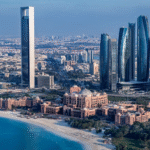Now Reading: UAE’s Smart City Revolution: 5 Powerful Ways Dubai and Abu Dhabi Lead
-
01
UAE’s Smart City Revolution: 5 Powerful Ways Dubai and Abu Dhabi Lead
UAE’s Smart City Revolution: 5 Powerful Ways Dubai and Abu Dhabi Lead

Table of Contents
The United Arab Emirates UAE has become one of the global leaders in smart city development. With its ambitious vision, strong investment in technology, and forward-thinking government, the UAE is building cities of the future today. From Dubai’s drive to become the world’s smartest city to Abu Dhabi’s advanced digital transformation projects, the country is setting new global standards in urban innovation.
What is a Smart City?
A smart city uses digital technology, data, and artificial intelligence to improve how people live, work, and travel. It focuses on making services faster, transportation smoother, buildings greener, and security stronger. The goal is not just modernization but also sustainability and better quality of life for residents and visitors.
In the UAE, smart cities go beyond just technology. They are part of the national vision to build sustainable, safe, and highly connected urban spaces that support future generations.
Dubai: The Smartest City in the Making
Dubai has been at the center of the UAE’s smart city movement. The city launched the Smart Dubai Initiative in 2014 with the goal of becoming the smartest and happiest city in the world. Since then, several key projects have reshaped urban life.
- Smart Dubai 2021 Strategy – This ambitious plan aimed to digitize all government services, reduce paper use, and connect residents through seamless platforms. Today, Dubai Government has gone 100% paperless, saving millions of hours of work and thousands of trees.
- Dubai Blockchain Strategy – Dubai became the first government in the world to adopt blockchain across public services, ensuring transparency and security in transactions.
- Smart Transportation – The city is testing autonomous vehicles, expanding electric car charging stations, and introducing AI-based traffic systems. Dubai’s Roads and Transport Authority (RTA) has announced that 25% of all journeys will be smart and driverless by 2030.
- Dubai Data Initiative – Through this program, the city collects and shares data to improve services, from healthcare to waste management.
Dubai is also home to projects like the Museum of the Future, the Dubai Internet City, and the planned Dubai Smart City District, all of which aim to position it as a global hub of innovation.
Abu Dhabi: Smart and Sustainable Transformation

While Dubai leads in tech-driven services, Abu Dhabi is focusing on sustainability and long-term urban planning. The capital has invested heavily in creating eco-friendly, digitally advanced urban spaces.
- Masdar City – One of the world’s most famous sustainable cities, Masdar City combines renewable energy, smart grids, and energy-efficient design. It serves as a testbed for clean technologies and future urban living.
- Abu Dhabi Digital Authority (ADDA) – ADDA drives the emirate’s digital transformation. Its focus areas include artificial intelligence, government digital services, cybersecurity, and cloud-based infrastructure.
- Smart Mobility Projects – Abu Dhabi has been introducing smart parking, electric buses, and AI traffic systems to ease congestion and cut emissions.
- Energy and Water Management – Smart meters, solar power, and sustainable water solutions are being introduced across the city.
Abu Dhabi is not just focusing on digitalization but also making sure smart city development aligns with its environmental commitments and economic diversification plans.
Beyond Dubai and Abu Dhabi: A Nationwide Vision
The UAE’s smart city initiatives extend beyond its two largest cities. Sharjah, Ajman, and Ras Al Khaimah are also making strides in digital governance and sustainability.
- Sharjah is investing in smart education platforms and eco-friendly infrastructure.
- Ajman has rolled out smart police services and e-government portals.
- Ras Al Khaimah is focusing on renewable energy and sustainable urban planning.
These efforts are part of the UAE’s wider Vision 2031 and Net Zero 2050 Strategy, which aim to make the country a leader in digital innovation and green development.
Benefits of UAE’s Smart City Drive

The UAE’s push for smart cities brings many benefits for residents, businesses, and the environment.
- Better Quality of Life: Faster services, safer streets, and smoother transport improve daily living.
- Sustainability: Eco-friendly energy systems reduce the carbon footprint and protect natural resources.
- Economic Growth: Smart infrastructure attracts global companies, startups, and investors.
- Global Reputation: By leading in innovation, the UAE strengthens its position as a hub for business and tourism.
Challenges and Future Outlook
Building smart cities comes with challenges. Cybersecurity, data privacy, and the need for constant investment are key concerns. The government must also ensure that technology serves everyone equally and does not leave some communities behind.
Looking ahead, the UAE is set to expand its smart city vision with stronger AI integration, green infrastructure, and autonomous technologies. Expo 2020 Dubai, which showcased many smart solutions, gave the world a glimpse of what the UAE aims to achieve on a larger scale.
By 2050, experts expect UAE cities to be fully interconnected, with zero-emission transport, AI-driven governance, and sustainable energy powering everyday life.
Conclusion
The UAE’s smart city initiatives in Dubai, Abu Dhabi, and beyond show how technology can shape the future of urban living. With strong leadership, clear goals, and large-scale investment, the country is building some of the world’s most advanced and sustainable cities.
As other nations look for models of urban transformation, the UAE stands out as a shining example of how to merge technology, sustainability, and human happiness in one vision.
READ MORE:- Inside the World of Business Acquisitions: Secrets of Corporate Growth 2025






















